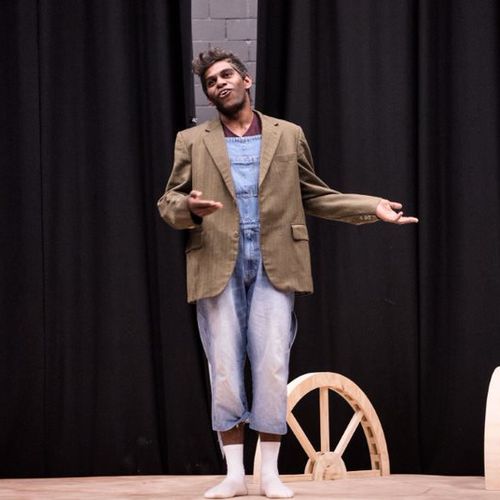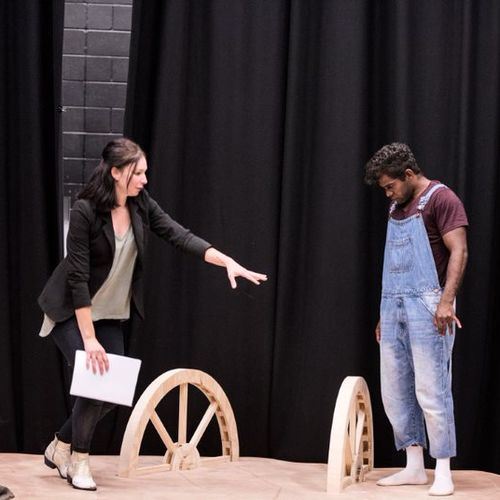Review by Frank McKone for the Canberra Critics Circle
29 June 2017
You may wonder about why an Aboriginal actor would play the intrinsically English The Wind in the Willows story for children. If so, you could not do better than hear Shaka Cook speak when he had just graduated from his NIDA training in 2013:
http://pff.com.au/news/location-news/tom-price-student-graduates-nida/
Cook has made his name in many major productions since that time, most recently in the film version of Jasper Jones. But it is his story-telling skills, surely derived from the culture of his Pilbara Aboriginal community of Wakathuni, that makes his work in this production a valuable step towards his aim of making the world a better place.
Here he plays the tricky character of Toad, the traditionally dangerous figure whose exaggerated sense of his own importance undermines community, telling his story of destruction and redemption. To do this, Toad acts all the parts – of Mole, Ratty, and Badger, as well as the Magistrate, prison guard and the Washer Woman who provides Toad with her shawl to make his escape – meaning, of course that Shaka Cook takes this risk that the children can follow the complex story, and moral implications, of him playing Toad acting all these others, as well as occasionally almost being in the conventional role of actor/teacher arranging the children’s participation activities, which include finding sock puppets under their seats to be come weasels and ferrets for the very funny Battle of Toad Hall.
The advertising is for ‘children aged 4 – 12’, and as the show began I wondered if the younger ones could cotton on, yet the two nearest me – one so young she still sucked a dummy, and the other, Emma, aged 8 – were both engaged from the beginning as Toad almost fell down the auditorium stairway in his convict-arrows prison costume, so upset by the ‘injustice’ that had condemned him. Cook’s athletic physicality and voices in one sense were in the European clown tradition, almost satirising melodrama, while deftly characterising each role in mime.
I spoke with Emma and her (I assume) grandmother at the end about how she understood the central theme. Did Emma think Toad had really reformed? She thought perhaps, but she couldn’t be sure. Good realistic thinking for an 8-year-old on this moral issue. Writer Maxine Mellor and Director Kat Henry, combined with Shaka Cook’s acting skills and cultural understanding, clearly focussed the story accurately, rather than allowing the romance of the wild wood to soften the ethical edge of Kenneth Grahame’s work.
In my own more romantic experience of The Wind in the Willows, as a child in England, I identified with the self-effacing Mole while finding Toad essentially obnoxious despite his attempts at mending his particularly unacceptable driving habits. So it was quite enlightening to spend three weeks recently driving from the north-west to the south-east of England to discover how polite the English drivers are, especially compared with the impatient French (in the following three weeks) and with Canberrans on the way to Queanbeyan this morning, several of whom drove far too fast and changed lanes in a manner entirely consistent with the worst of Toad’s exploits.
I’ve concluded that the difference is the moral injunction that all those English drivers learnt from The Wind in the Willows: not just that Toad on the road is a disaster, but that the forgiveness of Mole is what keeps us together and safe.
And so, I suggest, La Boite does the world an educational service in this production, as Shaka Cook would hope, by bringing out Mole, Ratty and Badger’s insistence on doing the right thing by Toad, despite his bad behaviour, in the belief that this is the best way to encourage his genuine redemption, even if, as Emma said, we can’t be entirely sure he will keep to his promise.
This successfully, as the publicity says, takes ‘badgers (small and large) on a heartfelt and humorous adventure that explores humanity, time and the value of friendship’, so I was surprised to see such a small audience there this morning. Though a school is booked tomorrow, I understand school bookings are less than expected.
So I wonder, too, if time is bypassing The Wind in the Willows in schools, since the days (in the 1950s) when I found myself teaching and dramatising this story with Year 7 students. Maybe Toad’s horse-drawn caravan and his excitement with new-fangled fast cars belong to a too-distant past for the internet age. But I suggest the essential moral questions are still as valid as ever, including the nature of the greedy rich represented in the self-promotion of Toad and his aggrandisement in Toad Hall, and in the warfare engendered by unreasonable wealth, seen in the jealousy of the weasels and ferrets in this Wild Wood.
So, though I was surprised by the success of this production among 4-year-olds, I suggest it certainly should have a place in the education of 8-year-olds and even 12-year-olds to help further Shaka Cook’s aim to make the world a better place.





Tell us your story